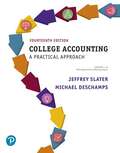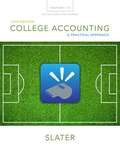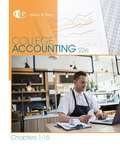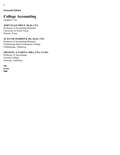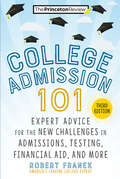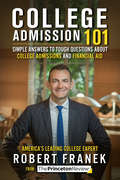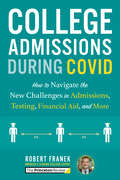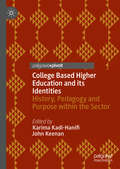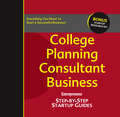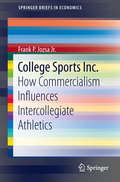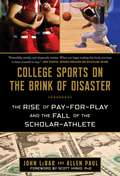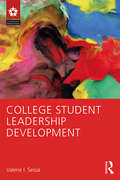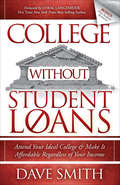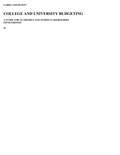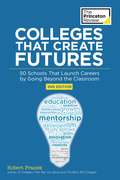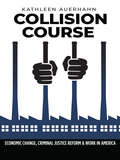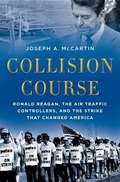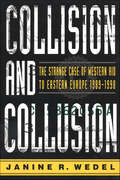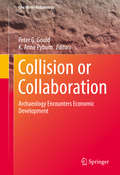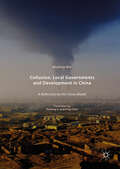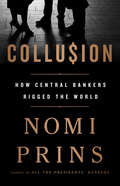- Table View
- List View
College Accounting: Chapters 1-12 With Study Guide and Working Papers
by Jeffrey Slater Mike DeschampsCollege Accounting Chapters 1-12 with Study Guide and Working Papers provides readers with a strong foundation in the basics of accounting. New co-author, Mike Deschamps, stresses the importance of helping students develop employable skills by focusing readers’ attention on, and helping them learn, the material they’ll need to be successful in their careers. Organized in a clear, easy-to-follow format, the text contains a plethora of learning tools and practice opportunities to help students immediately put their skills to use. The 14th Edition stays current with modern accounting techniques and resources, including the American Institute of Professional Bookkeeper boxes and new trends in banking technology. With this, students are prepared to start exciting careers in the field of accounting.
College Accounting: Chapters 1-12 with Study Guide and Working Papers (Thirteenth Edition)
by Jeffrey SlaterProvides a strong foundation in the basics of accounting. The material is organized in a clear, easy-to-follow format, and each chapter contains a plethora of learning tools and practice materials to help students immediately put their skills to use. The Thirteenth Edition stays current with modern accounting tools and techniques and includes updated computer workshops using Sage 50 and QuickBooks. Students are also introduced to new trends in banking technology and updated tax information.
College Accounting: Chapters 1-15
by Robert Parry James A. HeintzThe leading Heintz/Parry's COLLEGE ACCOUNTING, 22E combines a step-by-step approach and excellent examples with an online homework tool that makes accounting understandable, regardless of your accounting background or business experience. Known for its clarity and accompanying technology, this book focuses on the skills needed to transition from the classroom to the workplace. The book begins with a basic foundation and simple service company examples before advancing to accounting within the more challenging merchandising and manufacturing environments. Engaging learning features reinforce the relevance of skills you're learning and ensure an understandable presentation.
College Accounting: Chapters 1-30
by John Ellis Price M. David Haddock Jr. Michael J. FarinaThrough proven pedagogy and a straightforward approach to the basics of accounting, College Accounting, Sixteenth Edition, offers first-time accounting students a path to understanding and mastery. The authors represent the breadth of educational environments ensuring that the text is appropriate for all student populations. Throughout, they have adhered to a common philosophy about textbooks: they should be readable, contain many opportunities for practice, and be able to make accounting relevant for all.
College Admission 101, 3rd Edition: Expert Advice for the New Challenges in Admissions, Testing, Financial Aid, and More (College Admissions Guides)
by The Princeton Review Robert FranekThis friendly, helpful Q&A book from the editor-in-chief of The Princeton Review presents simple answers to your toughest questions about navigating the college admissions process, figuring out financial aid, and getting into the university of your choice! As The Princeton Review&’s Editor-in- Chief and nationally renowned expert on education, Robert Franek speaks with tens of thousands of anxious students and parents each year, advising them on how to turn their college hopes into reality. College Admission 101 is an accessible, timely collection of the 60+ most-asked questions Rob hears. Uncomplicate your search with straightforward answers to questions like: • How has college admissions changed since 2020? • What changes are coming to the PSAT and SAT? • Should I take the ACT, SAT, or both? • What&’s more important: GPA or test scores? • How do I write a game-changing college essay? • What extracurricular activities do colleges want to see? • How does the financial aid process work?
College Admission 101: Simple Answers to Tough Questions about College Admissions & Financial Aid (College Admissions Guides)
by Princeton Review Robert FranekThis friendly, helpful Q&A book from the editor-in-chief of The Princeton Review presents simple answers to your toughest questions about the college admissions process, figuring out financial aid, and getting into the university of your choice!As The Princeton Review’s chief expert on education, Robert Franek frequently appears on ABC, CBS, NBC, and FOX to share his insider expertise on the college admissions process. Each year, he travels to high schools across the country, advising thousands of anxious students and parents on how to turn their college hopes into reality. Now, with College Admission 101, the best of Rob’s wisdom has finally been collected in one place! From standardized tests to financial aid, Rob provides straightforward answers to 60+ of the questions he hears most often, including:· Should I take the ACT or SAT?· When should I start my college research?· How many schools should I apply to?· Will applying Early Decision or Early Action give me a leg up?· Which extracurricular activities do colleges want to see?· How does the financial aid process work?· What’s more important: GPA or test scores?
College Admissions During COVID: How to Navigate the New Challenges in Admissions, Testing, Financial Aid, and More (College Admissions Guides)
by The Princeton Review Robert FranekThe ONLY COLLEGE ADMISSIONS ADVICE GUIDE SPECIFICALLY FOR STUDENTS GRADUATING IN 2021 and 2022! College Admissions During COVID provides the latest info & recommendations for successfully navigating your application process during the global coronavirus pandemic.· If my target school is test-optional, do I still need to take the SAT or ACT?· What should I do if most of my extracurriculars were canceled due to lockdowns?· Should I consider a gap year in the hopes that things will be more settled later?· What should I expect if I have to take a standardized test (like the APs or ACT) from home?· Is it even worth enrolling in college, if classes will all be remote?Students in the entering classes of 2021 and 2022 face a college admissions landscape unlike any before. The massive changes wrought by the ongoing COVID-19 pandemic have upended once-standard admissions advice, with new questions—like those above—arising daily.Fortunately, Rob Franek, editor-in-chief at The Princeton Review and nationally-recognized college admissions expert, is here to help you fill in those gaps with straightforward, balanced information. COLLEGE ADMISSIONS DURING COVID (a new edition of our popular College Admissions 101, specifically updated with advice for the current situation) gathers together the 70+ questions that Rob is hearing most frequently from students and parents, and answers them with information garnered from deans, admissions officers, and his own 25+ years of expertise. Some things remain the same (yes, you should write an essay!), but others have changed (you may have to postpone that campus visit). No matter how crazy things seem, Rob and The Princeton Review are here to help guide you through this difficult time and set you up for college admission success!
College Based Higher Education and its Identities: History, Pedagogy and Purpose within the Sector
by Karima Kadi-Hanifi John KeenanThis book explores the history, purpose and understandings of College Based Higher Education. Drawing together the perspectives of researchers and practitioners in the field, the book traces its history and aims, and identifies issues paramount to the survival of the sector, uniting a wealth of knowledge and experience. Emphasising the need for a distinct identity, unique teaching and a research culture, this book acts as a clarion call for the sector to recognise its own importance and value, and to act as a hope in a higher education environment which is increasingly marketised, competitive and unsustainable. This book will appeal to scholars of College Based Higher Education and higher education in general, as well as policy makers and practitioners.
College Planning Consultant Business
by Entrepreneur Magazine Eileen Figure SandlinA record 21.6 million students attended American colleges and universities in the fall of 2012. Of those students, the U.S. Census Bureau says, more than 4.4 million were in the 15-19 age bracket, the market primed and ready for the advice dispensed by college consultants. The experts at Entrepreneur zero in on this growing marketing and show education enthusiasts how to turn their passion into profits with a college planning and consultant business.
College Sports Inc.: How Commercialism Influences Intercollegiate Athletics (SpringerBriefs in Economics)
by Frank P. Jozsa Jr.For several decades in America, athletic programs in colleges and universities received financial support and resources primarily from their respective schools and such sources as alumni and the National Collegiate Athletic Association (NCAA). More recently, however, college coaches assigned to athletic departments and the presidents and marketing or public relations officials of schools organize, initiate, and participate in fund-raising campaigns and thus obtain a portion of revenue for their sports programs from local, regional and national businesses, and from other private donors, groups, and organizations. Because of this inflow of assets and financial capital, intercollegiate athletic budgets and types of sports expanded and in turn, these programs became increasingly important, popular, and reputable as revenue and cost centers within American schools of higher education.
College Sports on the Brink of Disaster: The Rise of Pay-for-Play and the Fall of the Scholar-Athlete
by Allen Paul John LeBarImpelled by runaway spending and rampant corruption, America's much-beloved games of college basketball and football are being threatened. The specter of billion-dollar sums being showered on coaches, voracious athletic directors, hordes of support staff and lavish comforts for fans has led to a near-deafening roar to pay the players. The injustice of such sums being amassed, in the main, from the labor of young men of color many of whom come from disadvantaged backgrounds cannot be justified; and yet, American society has allowed this intractable problem to fester for more than half a century. Lured by the glitter of untold riches, naive young players enroll year after year in colleges and universities expecting the ultimate reward of a highly paid career as a pro. Only a minuscule few will advance that far; even fewer will reap significant financial rewards. Instead of educating them, colleges and universities force them into full-time athletic jobs in which their labor is shamelessly exploited. Small wonder that outraged critics demand compensation for the players, but these same critics only present vague answers when asked how such a radical change would work. College Sports on the Brink of Disaster, first published as Marching Toward Madness and now newly updated, cites twenty-one reasons why the pro-pay position is wrong, among them the prospect that the player talent pool will be concentrated to even fewer rich schools; recruiting wars will lead to more frequent scandals; and the regulatory powers of the NCAA will exponentially increase. Worst of all, pay-for-play will encourage schools to shirk even further the imperative to educate the young athletes.College Sports on the Brink of Disaster presents comprehensive reforms to end cheating and corruption in college sports, to put academics first, and to end the peonage of non-white athletes once and for all.
College Student Leadership Development (Leadership: Research and Practice)
by Valerie I. SessaCollege Student Leadership Development introduces the idea that we all play a part in producing leadership and that learning how to participate in the process of leadership is something that all college students need to learn as part of their college academic experience. Rather than approaching leadership from the traditional model emphasizing specific skill sets, this book acquaints students with how to learn leadership using the ReAChS model of leadership development (Reflection, Assessment, Challenge, Support). It then encourages students to directly engage their own experiences to hone their leader identity and understanding of leadership as well as improve their leadership knowledge and skills. Step-by-step exercises lead students in reflecting on their experiences, assessing themselves, choosing challenges, creating support networks, and finally capturing and communicating to others what they have learned. Throughout, examples of student leaders’ experiences provide readers with powerful examples of others’ successes and struggles in leadership alongside the latest psychological research on learning and development.
College Without Student Loans: Attend Your Ideal College & Make It Affordable Regardless of Your Income
by Dave SmithCollege Without Student Loans is the springboard to beginning a successful professional career while being free of the debt burden that encumbers over 80% of those currently graduating. You do not have to be another statistic for Federal government loan program or be saddled with long-term monthly payments to Uncle Sam. Attend the institution that fits you the best, while securing meaningful employment, with your undergraduate degree in hand. These are just a few of the reasons why you need to read this book and uncover the secrets to winning the “Game of College”. When you follow the SAFE steps your results will be dramatic and predictable, positioning you for a productive, meaningful and happier life.
College and University Budgeting: A Guide for Academics and Other Stakeholders
by Larry GoldsteinSince publication of the last edition of this primer, budgeting has assumed a new importance as many colleges and universities are facing the sobering question of whether existing services and staffing levels can be sustained. <p><p>This third edition is an invaluable tool in helping new academic administrators and faculty members understand how an institution's budget goes beyond mere numbers to define what an institution is all about and the significance of the budgeting process especially when there are fewer resources to allocate.
Colleges That Create Futures, 2nd Edition: 50 Schools That Launch Careers by Going Beyond the Classroom
by Princeton ReviewCHOOSE A COLLEGE THAT WILL LAUNCH A CAREER!When it comes to getting the most out of college, the experiences you have outside the classroom are just as important as what you study. Colleges That Create Futures looks beyond the usual “best of” college lists to highlight 50 schools that empower students to discover practical, real-world applications for their talents and interests. The schools in this book feature distinctive research, internship, and hands-on learning programs—all the info you need to help find a college where you can parlay your passion into a successful post-college career.Inside, You'll Find:• In-depth profiles covering career services, internship support, student group activity, alumni satisfaction, noteworthy facilities and programs, and more• Candid assessments of each school’s academics from students, current faculty, and alumni• Unique hands-on learning opportunities for students across majors• Testimonials on career prep from alumni in business, education, law, and much more***************************What makes Colleges That Create Futures important? You've seen the headlines—lately the news has been full of horror stories about how the college educational system has failed many recent grads who leave school with huge debt, no job prospects, and no experience in the working world. Colleges That Create Futures identifies schools that don't fall into this trap but instead prepare students for successful careers!How are the colleges selected? Schools are selected based on survey results on career services, grad school matriculation, internship support, student group and government activity, alumni activity and salaries, and noteworthy facilities and programs.
Collibra
by Lynda M. Applegate Jeffrey Rayport Julia KelleyFounded in 2008 at Vrije Universiteit Brussels, Collibra was a data intelligence company that found product-market fit in the years after the global financial crisis, when many companies were under pressure from consumers and governments to improve their data management efforts. Over the years, Collibra expanded its product offering from a Semantic Data Integration tool to a Data Governance Platform with a range of data management and governance tools, and also expanded geographically from Belgium to the U.S. and other countries. In 2019, with more than 350 clients, Collibra became a unicorn with a valuation of more than $1 billion. Now, co-founders Felix Van de Maele, Stijn Christiaens, and Pieter De Leenheer needed to decide how to move from "data governance" to "data intelligence
Collision Course in Commercial Aircraft: Boeing-Airbus-McDonnell Douglas--1991 (A)
by David B. Yoffie Eric J. VayleDescribes the competitive situation that has arisen in the commercial aircraft manufacturing industry since Airbus entered in 1970. Having overtaken McDonnell Douglas for second place, Airbus announces plans to challenge market leader Boeing's last pocket of dominance. Industry and government officials have long complained about assistance that Airbus receives from its governments, and this new challenge threatens to spark a new battle between the governments. Pushes students to examine issues facing industry players--high risk, long-term investments; technological change; intense selling competition--and issues facing their national governments--fair vs. unfair trade; important national industries--in a highly visible time frame for players and governments.
Collision Course in Commercial Aircraft: Boeing-Airbus-McDonnell Douglas--1991 (A)
by David B. Yoffie Eric J. VayleDescribes the competitive situation that has arisen in the commercial aircraft manufacturing industry since Airbus entered in 1970. Having overtaken McDonnell Douglas for second place, Airbus announces plans to challenge market leader Boeing's last pocket of dominance. Industry and government officials have long complained about assistance that Airbus receives from its governments, and this new challenge threatens to spark a new battle between the governments. Pushes students to examine issues facing industry players--high risk, long-term investments; technological change; intense selling competition--and issues facing their national governments--fair vs. unfair trade; important national industries--in a highly visible time frame for players and governments.
Collision Course: Economic Change, Criminal Justice Reform, and Work in America
by Kathleen AuerhahnThis book is about the convergence of trends in two American institutions – the economy and the criminal justice system. The American economy has radically transformed in the past half-century, led by advances in automation technology that have permanently altered labor market dynamics. Over the same period, the U.S. criminal justice system experienced an unprecedented expansion at great cost. These costs include not only the $80 billion annually in direct expenditures on criminal justice, but also the devastating impacts experienced by justice-involved individuals, families, and communities. Recently, a widespread consensus has emerged that the era of “mass incarceration” is at an end, reflected in a declining prison population. Criminal justice reforms such as diversion and problem-solving courts, a renewed focus on reentry, and drug policy reform have as their goal keeping more individuals with justice system involvement out of prisons, in the community and subsequently in the labor force, which lacks the capacity to accommodate these additional would-be workers. This poses significant problems for criminal justice practice, which relies heavily on employment as a signal of offenders’ intentions to live a law-abiding lifestyle. The diminished capacity of the economy to utilize the labor of all who have historically been expected to work presents significant challenges for American society. Work, in the American ethos is the marker of success, masculinity and how one “contributes to society.” What are the consequences of ignoring these converging structural trends? This book examines these potential consequences, the meaning of work in American society, and suggests alternative redistributive and policy solutions to avert the collision course of these economic and criminal justice policy trends.
Collision Course: Ronald Reagan, the Air Traffic Controllers, and the Strike That Changed America
by Joseph MccartinIn August 1981, the Professional Air Traffic Controllers Organization (PATCO) called an illegal strike. The new president, Ronald Reagan, fired the strikers, establishing a reputation for both decisiveness and hostility to organized labor. As Joseph A. McCartin writes, the strike was the culmination of two decades of escalating conflict between controllers and the government that stemmed from the high-pressure nature of the job and the controllers' inability to negotiate with their employer over vital issues. PATCO's fall not only ushered in a long period of labor decline; it also served as a harbinger of the campaign against public sector unions that now roils American politics. Collision Course sets the strike within a vivid panorama of the rise of the world's busiest air-traffic control system. It begins with an arresting account of the 1960 midair collision over New York that cost 134 lives and exposed the weaknesses of an overburdened system. Through the stories of controllers like Mike Rock and Jack Maher, who were galvanized into action by that disaster and went on to found PATCO, it describes the efforts of those who sought to make the airways safer and fought to win a secure place in the American middle class. It climaxes with the story of Reagan and the controllers, who surprisingly endorsed the Republican on the promise that he would address their grievances. That brief, fateful alliance triggered devastating miscalculations that changed America, forging patterns that still govern the nation's labor politics. Written with an eye for detail and a grasp of the vast consequences of the PATCO conflict for both air travel and America's working class, Collision Course is a stunning achievement.
Collision and Collusion: The Strange Case of Western Aid to Eastern Europe 1989–1998
by Janine R. WedelWhen the Soviet Union's communist empire collapsed in 1989, a mood of euphoria took hold in the West and in Eastern Europe. The West had won the ultimate victory--it had driven a silver stake through the heart of Communism. Its next planned step was to help the nations of Eastern Europe to reconstruct themselves as democratic, free-market states, and full partners in the First World Order. But that, as Janine Wedel reveals in this gripping volume, was before Western governments set their poorly conceived programs in motion. Collision and Collusion tells the bizarre and sometimes scandalous story of Western governments' attempts to aid the former Soviet block. He shows how by mid-decade, Western aid policies had often backfired, effectively discouraging market reforms and exasperating electorates who, remarkably, had voted back in the previously despised Communists. Collision and Collusion is the first book to explain where the Western dollars intended to aid Eastern Europe went, and why they did so little to help. Taking a hard look at the bureaucrats, politicians, and consultants who worked to set up Western economic and political systems in Eastern Europe, the book details the extraordinary costs of institutional ignorance, cultural misunderstanding, and unrealistic expectations.
Collision or Collaboration: Archaeology Encounters Economic Development (One World Archaeology)
by Peter G. Gould K. Anne PyburnArchaeology has an often contentious relationship with the consequences of economic development. Tourism, urban development and natural resource exploitation have generated adverse impact on the archaeological record, indigenous cultures and local communities worldwide. Over the decades, international conventions, national laws and corporate ventures have sought to address the problems, but too often they have fallen short and immense challenges remain. Looking ahead, the contributions to this volume constitute a global conversation on the most salient issue facing archaeology as it interacts with economic development: Is collision with development still the best course? Or, is a more effective strategy to pursue collaborative relationships with the forces of economic and social change?
Collusion, Local Governments and Development in China: A Reflection on the China Model
by Huihua NieBy analyzing the interactions between China's central government and its local governments and enterprises, this book constructs an analytical framework of government-enterprise collusion, analyzing the impact of collusion within the China model on Chinese society. Against the background of decentralization and under information asymmetry, this text argues that Chinese local governments connive at enterprises' adoption of a low-cost 'bad' mode of production -- a 'stimulus' for quick growth at the cost of safer working conditions -- so as to obtain fiscal or political capital for further promotion. Through an examination of coalmine mortality rate, environmental pollution, food safety and house pricing, the book argues that collusion is the intrinsic drive of the China model. It consider how against a backdrop of political centralization and economic decentralization, collusion exacerbates corruption and impacts both on the country's social development and on its foreign direct investment. Offering an analysis of future prospects for the China model, it puts forward key policy proposals to improve domestic institutional construction through reform.
Collusion: How Central Bankers Rigged the World
by Nomi PrinsIn this searing exposé, former Wall Street insider Nomi Prins shows how the 2007-2008 financial crisis turbo-boosted the influence of central bankers and triggered a massive shift in the world order.Central banks and international institutions like the IMF have overstepped their traditional mandates by directing the flow of epic sums of fabricated money without any checks or balances. Meanwhile, the open door between private and central banking has ensured endless opportunities for market manipulation and asset bubbles--with government support.Through on-the-ground reporting, Prins reveals how five regions and their central banks reshaped economics and geopolitics. She discloses how Mexico navigated its relationship with the US while striving for independence and how Brazil led the BRICS countries to challenge the US dollar's hegemony. She explains how China's retaliation against the Fed's supremacy is aiding its ongoing ascent as a global superpower and how Japan is negotiating the power shift from the West to the East. And she illustrates how the European response to the financial crisis fueled instability that manifests itself in everything from rising populism to the shocking Brexit vote.Packed with tantalizing details about the elite players orchestrating the world economy--from Janet Yellen and Mario Draghi to Ben Bernanke and Christine Lagarde--Collusion takes the reader inside the most discreet conversations at exclusive retreats like Jackson Hole and Davos. A work of meticulous reporting and bracing analysis, Collusion will change the way we understand the new world of international finance.
Colombia and the Economic Premium of Peace
by Richard H.K. Vietor Hilary WhiteColombia, the fastest growing country in Latin America, continues to struggle with productivity. Both labor productivity and total factor productivity have been low for the past decade, despite economic growth of 4.7% annually. Many factors contribute-everything from infrastructure, to banking, to informality. President Santos, one year into his second term, is well aware of these difficulties and has put in place new policies to mitigate them. His focus, however, is on peace negotiations with the FARC-a possible settlement of the 50-year struggle which itself would significantly impact productivity.
